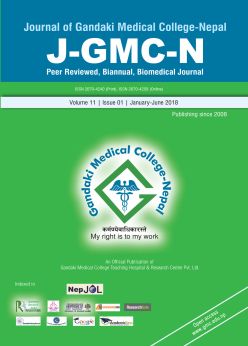A study to Assess the Knowledge Regarding Human Right of Mentally Ill Patient among Community People in Kaski, Pokhara,Nepal
DOI:
https://doi.org/10.3126/jgmcn.v12i2.27171Keywords:
Community, Human right, Mentally ill, knowledge, mythAbstract
Introduction: Mental health problems raise many human rights issues. People with mental illness are exposed to human rights violation within and outside the health care context. Because of lack of awareness, people with mental illness and their families do not exercise their rights. Psychiatric patients are most vulnerable groups in community. Incidence of violation of rights of mentally ill patients can be avoided if the community people become aware of them.
Objective: To assess knowledge regarding human rights and myth of mental illness among community people.
Method: A descriptive crosssectional study was conducted among 140 community people of Ritthepani-27, Kaski, Nepal. Non probability convenient sampling technique was adopted to collect the data. Inclusion criteria included head of the family of the selected community who were willing to participate in the study. Data was collected through face to face interview using a structured questionnaire.
Results: In the present study, it was found that 46.40% of the community people had inadequate knowledge regarding human rights of mentally ill patients. There was no significant association between demographic variables and knowledge score of the respondents. The study found that more than half of the respondents (51%) had belief that mental illness is not related to physical health. Likewise 36.4% believed mental illness is caused by supernatural power and evil and 30% believed that marriage can cure mental illness.
Conclusion: Based on findings, it is concluded that the level of knowledge regarding rights of mentally ill patient is inadequate and there is a high prevalence of myths and misconceptions related to mental illness among the adult population. So, there is need to conduct awareness raising activities in the community.
Downloads
Downloads
Published
How to Cite
Issue
Section
License
This license allows reusers to distribute, remix, adapt, and build upon the material in any medium or format for noncommercial purposes only, and only so long as attribution is given to the creator.




